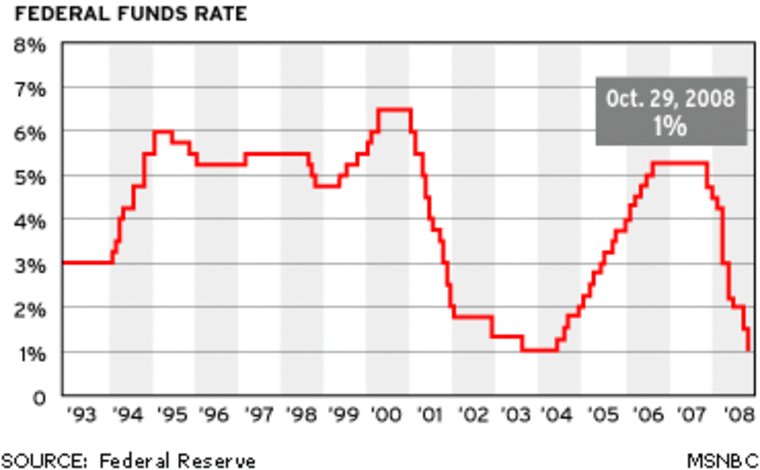Federal Reserve officials left short-term interest rates unchanged Tuesday at their current 46-year lows, reiterating their intention to be “patient” after the latest report showing surprisingly weak job growth.
The unanimous decision, which had been expected, leaves the benchmark federal funds rate at 1 percent, where it has remained since June, when Fed Chairman Alan Greenspan and his colleagues cut rates for a 13th consecutive time in an effort to boost the sluggish economy. The low federal funds rate produces a ripple effect that allows banks to offer cheap home equity loans and car dealers to offer zero-percent financing, among other things.
Low rates, along with a new round of tax cuts and mortgage refinancing activity, helped produce a surge in economic growth in the second half of 2003. But companies have been extremely slow to add workers compared with past recovery periods, leading to some questions about the sustainability of the recovery.
"Although job losses have slowed, new hiring has lagged," the Fed said in a statement issued after a meeting of its rate-setting Federal Open Market Committee. With the risks of inflation and deflation "almost equal," central bankers can be patient in removing the current "policy accommodation," the Fed said.
Stock markets seesawed wildly after the Fed decision was made public late in the session. The widely watched Dow Jones industrial average dropped about 100 points in the hour after the Fed's statement but then recovered virtually all its losses. At the close the index was up about 82 points or 0.8 percent.
Sung Won Sohn, chief economist for Wells Fargo, noted that Fed policy-makers were slightly more cautious in their outlook than they were after their last meeting Jan. 28 given the weak employment numbers since then.
"The stock market is kind of torn," Sohn said. "They like the idea that interest rates will remain low for a longer period, but with a weaker economy corporate profits will not be as high."
Analysts and traders were shocked March 5 when the government estimated the economy added only 21,000 jobs in February, compared with the 128,000 expected by analysts on average. Stock prices fell over the next several sessions to their lowest levels of the year and market interest rates dropped sharply as traders embraced the view that the Fed will wait until late this year or 2005 before raising rates.
Economists believe central bankers want to see the economy add at least 150,000 jobs a month for several months before considering a rate increase.
While Fed officials have expressed concern about the lack of job growth, other indicators show a relatively robust economy. New claims for unemployment have been dropping steadily, indicating a slowdown in the pace of layoffs. And businesses have been indicating in surveys that they are increasingly likely to add staff.
One such survey, released Tuesday by Manpower, showed that 28 percent of companies expect to increase hiring in the second quarter, the strongest results in three years, according to the staffing company.
Diane Swonk, chief economist at Bank One, said that because the Fed has left rates low for so long, it probably will have to tighten aggressively next year to prevent asset prices from overheating in a new bubble. She projected the benchmark federal funds rate would rise to 3.75 percent by the end of 2005 from its current 1 percent.
She said she was confident businesses will begin hiring enough to add 200,000 to 300,000 jobs to the economy each month by midyear, although she acknowledged weak job growth could keep anxiety levels high until then, especially under the glare of the presidential election campaign.
"That is unfortunate, but I think they will be pleasantly surprised by the second half of the year," she said. "Hiring plans are up. .... You can't come up with a reason why (businesses) wouldn’t eventually hire."
Rates on 30-year mortgages have fallen to their lowest levels since July, and rates on one-year adjustable-rate mortgages have dropped sharply as well, raising the prospect of a modest new wave of refinancing.
Full text of statement
Following is the full text of the statement issued by the Federal Reserve Tuesday:
The Federal Open Market Committee decided today to keep its target for the federal funds rate at 1 percent.
The Committee continues to believe that an accommodative stance of monetary policy, coupled with robust underlying growth in productivity, is providing important ongoing support to economic activity. The evidence accumulated over the intermeeting period indicates that output is continuing to expand at a solid pace. Although job losses have slowed, new hiring has lagged. Increases in core consumer prices are muted and expected to remain low.
The Committee perceives the upside and downside risks to the attainment of sustainable growth for the next few quarters are roughly equal. The probability of an unwelcome fall in inflation has diminished in recent months and now appears almost equal to that of a rise in inflation. With inflation quite low and resource use slack, the Committee believes that it can be patient in removing its policy accommodation.
Voting for the FOMC monetary policy action were: Alan Greenspan, Chairman; Timothy F. Geithner, Vice Chairman; Ben S. Bernanke; Susan S. Bies; Roger W. Ferguson, Jr.; Edward M. Gramlich; Thomas M. Hoenig; Donald L. Kohn; Cathy E. Minehan; Mark W. Olson; Sandra Pianalto; and William Poole.
